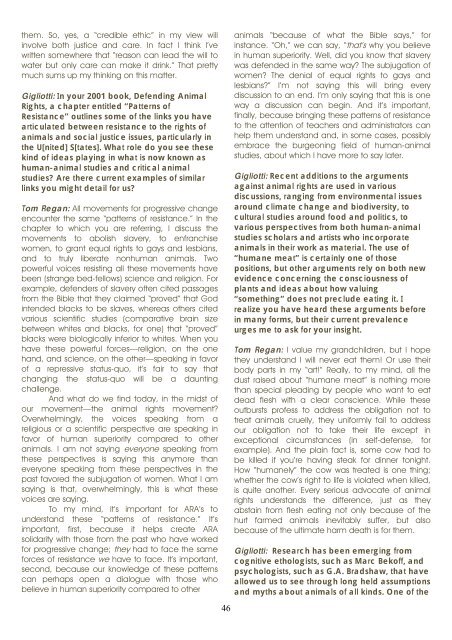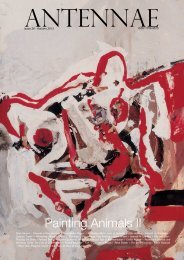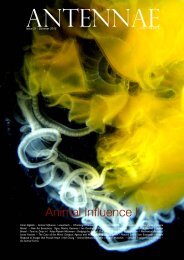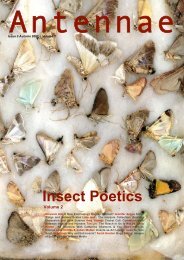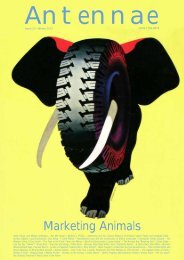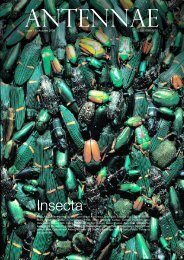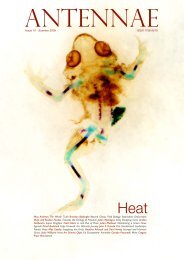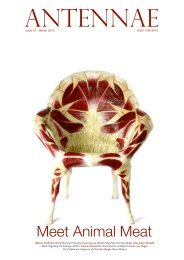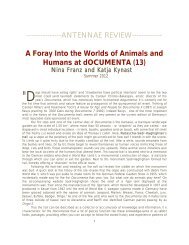Animal Wrongs and Rights - Antennae The Journal of Nature in ...
Animal Wrongs and Rights - Antennae The Journal of Nature in ...
Animal Wrongs and Rights - Antennae The Journal of Nature in ...
You also want an ePaper? Increase the reach of your titles
YUMPU automatically turns print PDFs into web optimized ePapers that Google loves.
them. So, yes, a “credible ethic” <strong>in</strong> my view will<br />
<strong>in</strong>volve both justice <strong>and</strong> care. In fact I th<strong>in</strong>k I’ve<br />
written somewhere that “reason can lead the will to<br />
water but only care can make it dr<strong>in</strong>k.” That pretty<br />
much sums up my th<strong>in</strong>k<strong>in</strong>g on this matter.<br />
Gigliotti: In your 2001 book, Defend<strong>in</strong>g <strong>Animal</strong><br />
<strong>Rights</strong>, a chapter entitled “Patterns <strong>of</strong><br />
Resistance” outl<strong>in</strong>es some <strong>of</strong> the l<strong>in</strong>ks you have<br />
articulated between resistance to the rights <strong>of</strong><br />
animals <strong>and</strong> social justice issues, particularly <strong>in</strong><br />
the U[nited] S[tates]. What role do you see these<br />
k<strong>in</strong>d <strong>of</strong> ideas play<strong>in</strong>g <strong>in</strong> what is now known as<br />
human-animal studies <strong>and</strong> critical animal<br />
studies? Are there current examples <strong>of</strong> similar<br />
l<strong>in</strong>ks you might detail for us?<br />
Tom Regan: All movements for progressive change<br />
encounter the same “patterns <strong>of</strong> resistance.” In the<br />
chapter to which you are referr<strong>in</strong>g, I discuss the<br />
movements to abolish slavery, to enfranchise<br />
women, to grant equal rights to gays <strong>and</strong> lesbians,<br />
<strong>and</strong> to truly liberate nonhuman animals. Two<br />
powerful voices resist<strong>in</strong>g all these movements have<br />
been (strange bed-fellows) science <strong>and</strong> religion. For<br />
example, defenders <strong>of</strong> slavery <strong>of</strong>ten cited passages<br />
from the Bible that they claimed “proved” that God<br />
<strong>in</strong>tended blacks to be slaves, whereas others cited<br />
various scientific studies (comparative bra<strong>in</strong> size<br />
between whites <strong>and</strong> blacks, for one) that “proved”<br />
blacks were biologically <strong>in</strong>ferior to whites. When you<br />
have these powerful forces—religion, on the one<br />
h<strong>and</strong>, <strong>and</strong> science, on the other—speak<strong>in</strong>g <strong>in</strong> favor<br />
<strong>of</strong> a repressive status-quo, it’s fair to say that<br />
chang<strong>in</strong>g the status-quo will be a daunt<strong>in</strong>g<br />
challenge.<br />
And what do we f<strong>in</strong>d today, <strong>in</strong> the midst <strong>of</strong><br />
our movement—the animal rights movement?<br />
Overwhelm<strong>in</strong>gly, the voices speak<strong>in</strong>g from a<br />
religious or a scientific perspective are speak<strong>in</strong>g <strong>in</strong><br />
favor <strong>of</strong> human superiority compared to other<br />
animals. I am not say<strong>in</strong>g everyone speak<strong>in</strong>g from<br />
these perspectives is say<strong>in</strong>g this anymore than<br />
everyone speak<strong>in</strong>g from these perspectives <strong>in</strong> the<br />
past favored the subjugation <strong>of</strong> women. What I am<br />
say<strong>in</strong>g is that, overwhelm<strong>in</strong>gly, this is what these<br />
voices are say<strong>in</strong>g.<br />
To my m<strong>in</strong>d, it’s important for ARA’s to<br />
underst<strong>and</strong> these “patterns <strong>of</strong> resistance.” It’s<br />
important, first, because it helps create ARA<br />
solidarity with those from the past who have worked<br />
for progressive change; they had to face the same<br />
forces <strong>of</strong> resistance we have to face. It’s important,<br />
second, because our knowledge <strong>of</strong> these patterns<br />
can perhaps open a dialogue with those who<br />
believe <strong>in</strong> human superiority compared to other<br />
46<br />
animals “because <strong>of</strong> what the Bible says,” for<br />
<strong>in</strong>stance. “Oh,” we can say, “that’s why you believe<br />
<strong>in</strong> human superiority. Well, did you know that slavery<br />
was defended <strong>in</strong> the same way? <strong>The</strong> subjugation <strong>of</strong><br />
women? <strong>The</strong> denial <strong>of</strong> equal rights to gays <strong>and</strong><br />
lesbians?” I’m not say<strong>in</strong>g this will br<strong>in</strong>g every<br />
discussion to an end. I’m only say<strong>in</strong>g that this is one<br />
way a discussion can beg<strong>in</strong>. And it’s important,<br />
f<strong>in</strong>ally, because br<strong>in</strong>g<strong>in</strong>g these patterns <strong>of</strong> resistance<br />
to the attention <strong>of</strong> teachers <strong>and</strong> adm<strong>in</strong>istrators can<br />
help them underst<strong>and</strong> <strong>and</strong>, <strong>in</strong> some cases, possibly<br />
embrace the burgeon<strong>in</strong>g field <strong>of</strong> human-animal<br />
studies, about which I have more to say later.<br />
Gigliotti: Recent additions to the arguments<br />
aga<strong>in</strong>st animal rights are used <strong>in</strong> various<br />
discussions, rang<strong>in</strong>g from environmental issues<br />
around climate change <strong>and</strong> biodiversity, to<br />
cultural studies around food <strong>and</strong> politics, to<br />
various perspectives from both human-animal<br />
studies scholars <strong>and</strong> artists who <strong>in</strong>corporate<br />
animals <strong>in</strong> their work as material. <strong>The</strong> use <strong>of</strong><br />
“humane meat” is certa<strong>in</strong>ly one <strong>of</strong> those<br />
positions, but other arguments rely on both new<br />
evidence concern<strong>in</strong>g the consciousness <strong>of</strong><br />
plants <strong>and</strong> ideas about how valu<strong>in</strong>g<br />
“someth<strong>in</strong>g” does not preclude eat<strong>in</strong>g it. I<br />
realize you have heard these arguments before<br />
<strong>in</strong> many forms, but their current prevalence<br />
urges me to ask for your <strong>in</strong>sight.<br />
Tom Regan: I value my gr<strong>and</strong>children, but I hope<br />
they underst<strong>and</strong> I will never eat them! Or use their<br />
body parts <strong>in</strong> my “art!” Really, to my m<strong>in</strong>d, all the<br />
dust raised about “humane meat” is noth<strong>in</strong>g more<br />
than special plead<strong>in</strong>g by people who want to eat<br />
dead flesh with a clear conscience. While these<br />
outbursts pr<strong>of</strong>ess to address the obligation not to<br />
treat animals cruelly, they uniformly fail to address<br />
our obligation not to take their life except <strong>in</strong><br />
exceptional circumstances (<strong>in</strong> self-defense, for<br />
example). And the pla<strong>in</strong> fact is, some cow had to<br />
be killed if you’re hav<strong>in</strong>g steak for d<strong>in</strong>ner tonight.<br />
How “humanely” the cow was treated is one th<strong>in</strong>g;<br />
whether the cow’s right to life is violated when killed,<br />
is quite another. Every serious advocate <strong>of</strong> animal<br />
rights underst<strong>and</strong>s the difference, just as they<br />
absta<strong>in</strong> from flesh eat<strong>in</strong>g not only because <strong>of</strong> the<br />
hurt farmed animals <strong>in</strong>evitably suffer, but also<br />
because <strong>of</strong> the ultimate harm death is for them.<br />
Gigliotti: Research has been emerg<strong>in</strong>g from<br />
cognitive ethologists, such as Marc Bek<strong>of</strong>f, <strong>and</strong><br />
psychologists, such as G.A. Bradshaw, that have<br />
allowed us to see through long held assumptions<br />
<strong>and</strong> myths about animals <strong>of</strong> all k<strong>in</strong>ds. One <strong>of</strong> the


